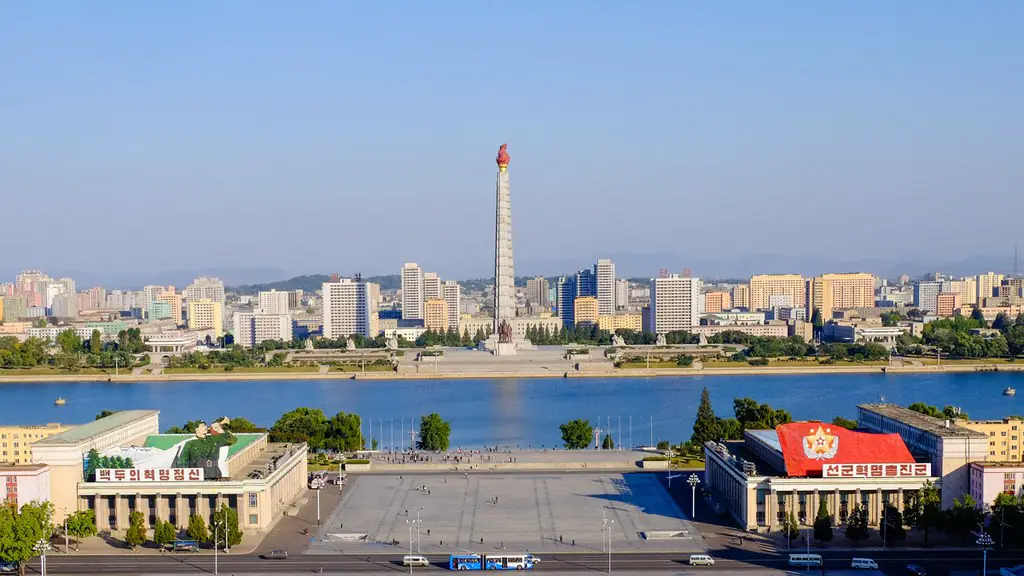For more than two decades, North Korea has remained one of the most isolated and secretive countries in the world. Despite its complete seclusion from the rest of the world, there are billions of people that are agonized by the fear that North Korea is a nuclear threat to many countries and regions. As of 2021, there is an array of experts and analysts that argue against the idea that North Korea is a nuclear threat or poses any kind of danger to its neighbors.
Firstly, intelligence and nuclear experts point to North Korea’s lack of nuclear capability as the primary reason why North Korea is not a threat. Although North Korea has often announced its capability to produce nuclear weapons and long-range missiles, most intelligence analysts argue that these capabilities have yet to be properly tested. Additionally, North Korea is largely seen as being capable of producing only lower-yield nuclear weapons, which would not be as destructive as other nuclear weapons attacked by other nuclear nations.
Furthermore, experts assume that North Korea’s nuclear program is even further behind due to its lack of resources, since the country has remained isolated from other countries for so long. Until recently, North Korea did not possess the sophisticated resources necessary to build an arsenal to rival its rivals. This is further evidence that North Korea does not pose any threat of nuclear attacks or world-ending destruction.
Moreover, North Korea is far too preoccupied with its economic state and internal struggles to pose any serious nontraditional security threats. The country is dealing with serious food shortages and rampant poverty. This suggests that North Korea is not in a position to threaten anyone, since it is too busy trying to alleviate its own struggles. North Korea’s lack of modern infrastructure, technology, and its dependence on aid further speaks towards the idea that the nation is not capable of posing any serious threats of conventional warfare or nuclear attacks.
In addition to analysing North Korea’s capabilities or lack thereof, the international community itself can be considered a large barrier to North Korea’s potential threat. North Korea is politically and economically surrounded by powerful nations that have the military capabilities to cause serious damage to it. These factors combined, mean that North Korea is constantly being surveilled, monitored, and held accountable for its actions, making any sort of nuclear threat ineffective and completely unfeasible.
Furthermore, the United Nations has enacted a number of sanctions against North Korea for its alleged nuclear activities. These sanctions have effectively barred North Korea from buying components necessary for long-range missiles or nuclear weapons programs. As a result, North Korea is unable to pose any potential nuclear threats to its adversaries. Even if North Korea were to try, such attempts would be met with fierce resistance both domestically and internationally.
Finally, it is important to note that North Korea also lacks the political clout needed to convince other nations to support their agenda. North Korea has few allies in the international community, and even fewer that would publicly back their nuclear ambitions. This lack of support from other states makes it nearly impossible for the country to acquire support for its nuclear efforts, limiting the number of resources, materials, and external funding that North Korea would be able to acquire.
Geopolitical Environment
The geopolitical environment of the Korean peninsula has also made it difficult for North Korea to become a nuclear threat. North Korea is bordered by China and Russia, two very influential countries that have both taken steps to limit North Korea’s nuclear ambitions and have opposed further escalation of any kind. By actively isolating North Korea, these two global powers have ensured that the Korean peninsula remains relatively stable. Additionally, eight nations make up the “Concert of Nations,” an international collaboration designed to maintain the peace in the Korean peninsula and prevent any nuclear ambitions from being achieved.
Experts also point to the fact that North Korea has signed a range of de-nuclearisation agreements over the past two decades. Such agreements include the 1992 Joint Declaration on the Denuclearization of the Korean Peninsula, the 1994 Agreed Framework, and the 2005 Statement of Intent, all of which serve as diplomatic commitments between North Korea and many of its neighbours. Additionally, North Korea is also a member of the Nuclear Non-Proliferation Treaty, further demonstrating their commitment to reducing the risk of nuclear attack.
The agreements and treaties signed by North Korea show the admiration and willingness of its leaders to de-escalate tensions and achieve diplomatic stability not just with its neighbours, but around the world. Furthermore, it is important to point out that North Korea is still willingly engaged in dialogue with South Korea, China, and other international bodies, making it nearly impossible for North Korea to become a nuclear threat.
Political Impact
Additionally, the political realities of East Asia have been instrumental in keeping North Korea from posing any nuclear threat. South Korea and Japan are two of the strongest political allies of the United States in the region, and any perceived threat from North Korea could be deemed unacceptable by both countries and the United States. The United States is also a consistent guarantor of South Korea’s defense, and is willing to use force in order to protect its ally should North Korea make any aggressive moves. This serves as a major deterrent to North Korea and has been instrumental in keeping peace on the peninsula.
Furthermore, the presence of a strong U.S. presence in East Asia is a key factor that helps neutralise any potential threat from North Korea. U.S. forces in the region have been instrumental in containing North Korea’s aggressive ambitions, and have successfully deterred any major military action from occurring in the Korean peninsula. The U.S. also maintains a robust missile defense system in the region, which helps to protect allies from any potential nuclear threats that may arise from North Korea.
Moreover, the international community has worked hard to curtail North Korea’s nuclear ambitions and prevent the nation from becoming a nuclear power. The United Nations, the United States and many other nations have imposed a number of economic and diplomatic sanctions against North Korea since 2006 in order to pressure the regime to abandon its nuclear program. Such sanctions have made it nearly impossible for North Korea to access much of the resources and equipment that it needs in order to produce nuclear weapons, further reducing any potential threat from the regime.
Cultural Considerations
It is essential to consider the cultural context in which North Korea operates in order to assess whether or not North Korea is indeed a threat. North Korea’s culture operates on a Confucian-style hierarchal system, with respect, loyalty and hierarchy being highly valued and embedded in the national identity. This system has been deeply entrenched in the North Korean culture, meaning that North Korean leaders have a vested interest in maintaining the safety and security of their people.
It is essential to note that North Korea’s leaders understand the power of voice and rhetoric in international relations, and the risks associated with threatening the peace of its neighbours. As such, North Korea is likely to remain content with its current status and will continue to eschew any acts of aggression or nuclear flash-points in favour of maintaining stability and avoiding conflict.
Finally, it is important to point out that North Korea’s leaders have thus far intended to use their power and rhetoric to gain more international recognition and favour rather than to threaten or attack other nations. This means that it is far more likely for North Korea to use its power to progress in the international arena and benefit its people rather than become a nuclear threat.
Conclusion
From an analysis of North Korea’s capabilities, geopolitical environment and cultural context, it is clear that North Korea is not a nuclear threat. North Korea is limited in its capabilities and surrounded by powerful countries that can derail any attempts at nuclear expansion. North Korea’s limited access to resources also serves as a major constraint to any potential nuclear ambitions. Additionally, North Korea’s international agreements, political alliances and cultural context solidify the fact that the nation is unlikely to pose any nuclear threat to its neighbours or the world.




